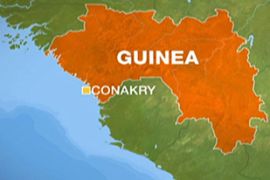Talks held to end Guinea revolt
Soldiers start receiving overdue pay after week-long demonstrations in the capital.

Published On 30 May 2008
Soldiers finally began receiving overdue wages on Friday as the government worked to quell the week-long riot in Conakry and surrounding areas.
On Wednesday, each soldier was promised five million Guinean francs ($1,100) in back-pay and the government said soldiers imprisoned in a similar revolt in May last year would be freed.
Mutinous soldiers
Disgruntled junior troops began firing into the air on Monday, in the direction of military bases on the edges of the capital and took the army’s second-in-command hostage.
Mamadou Sampil remains a hostage at the Alpha Yaya Diallo barracks, where soldiers said they would not consider his release until senior military officials came to the camp to negotiate directly.
“The generals need to come to the camp within 24 hours,” one soldier acting as their spokesman said.
In Friday’s meeting, Conte demanded the soldiers free all hostages, including Sampil.
“This is not only about money. We’ll take our money then we’ll see afterward what we need to do,” one soldier in the capital on his way to his barracks to pick up his pay said.
No clashes have been reported since Monday, but hospital officials say they have admitted at least 28 people with gunshot wounds, apparently from bullets fired into the air. Five of the injured were soldiers.
The 15-member regional Economic Community of West African States said the Guinea crisis “put at risk the safety and security of the civilian population and poses a grave threat to the fragile peace” in the region.
The neighbouring countries of Ivory Coast, Liberia and Sierra Leone are struggling to emerge from long civil wars.
Growing tensions
Tensions started to rise in the West African country last week when Conte unexpectedly fired Lansana Kouyate, the prime minister.
Soldiers said they feared the new prime minister would not honour a pledge to pay them.
Guinea, on Africa’s western coast, has vast reserves of timber, gold, diamonds and bauxite, the raw material used to make aluminum.
Yet it is consistently listed as one of the world’s poorest countries.
Conte had agreed to appoint Kouyate – seen as a reformer – last year after union protests over his rule turned deadly and threatened to overturn the government.
Source: News Agencies